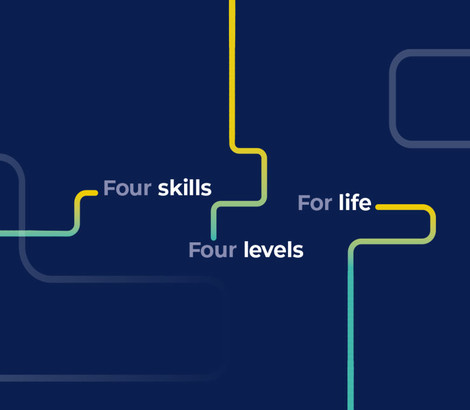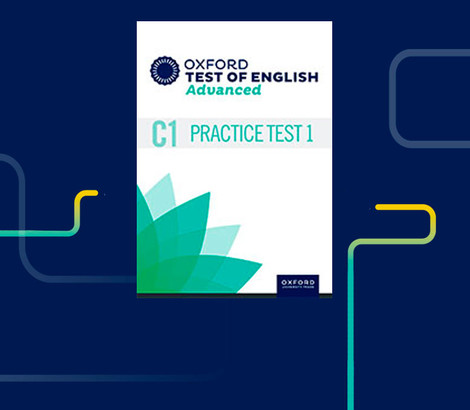



The Oxford Test of English Advanced is the 100% online, flexible and fast English assessment solution for Test Takers who want to prove their English proficiency at a higher level for professional or academic opportunities.
Your overall level of English is certified by the University of Oxford.
Secure, individualised digital experience in your choice of Approved Test Centre.
Accurately measures B2 to C1 (CEFR) general English proficiency, to give results you can trust.
Same day results for Reading and Listening. Speaking and Writing results are typically received within 5 days.
Find your nearest test centre
Select your province in the list to see your nearest Approved Test Centre – Oxford Test of English.
Find your nearest test centre
Discover the full suite of general English proficiency tests in the Oxford Test of English

Content adapted for students 16 years and older.

Content adapted to the interests and experiences of 12- to 16-year-olds.
About the exam
Are you going to university? Changing courses? Going away on Erasmus? Or planning the next step in your career?
Here are just a few reasons why you should take the Oxford Test of English Advanced:
- It gives Test Takers an externally validated statement of their proficiency in English, certified by the University of Oxford.
- The Test can be taken when it's really needed and in any module combination: Speaking, Reading, Listening and Writing. All four skills are assessed in approximately 2 hours.
- Individual modules can be later re-taken, and the Report Card will always show the latest and best result.
- The task scenarios replicate real-life language usage in social, work and study situations.
The Oxford Test of English is available to book throughout the year at a time that suits you.
Book your test at an Approved Test Centre by following these easy steps:
- Find your nearest test centre by clicking on the list below.
- Contact your local approved Test Centre to see when test sessions are available and book.
- Remember to prepare for the test with our free preparation materials. Check below ‘Get ready for the Test!’ section and try the test demo.
With the Oxford Test of English Advanced, your overall level of English is certified by the University of Oxford. Test takers receive same-day results for Reading and Listening, then Speaking and Writing results are typically received within 5 working days. Sign in to your account to see your results and print out your certificate.
Take or re-take as a full test, single modules, or in any combination – whatever your English proficiency needs!
Please note, your Oxford Test of English Advanced Certificate shows your best results for your Oxford Test of English Advanced modules only. Results from any Oxford Test of English or Oxford Test of English for Schools tests that you have taken are shown on a separate Certificate of Proficiency.
Read the Understanding Results guide to fully understand your certificate.
Results are valid for life.
Our team of education, language and assessment experts at Oxford University Press designed and developed the Oxford Test of English Advanced taking great care at each stage to ensure reliability, accuracy and alignment to the CEFR, including the new and updated descriptors in the CEFR Companion volume. This alignment with international standards leads to robust quality assurance processes:
- Test questions trialed with various language groups ensure the questions are fair, valid and reliable.
- Our processes are audited by the University of Oxford.
Overview of every module
The Oxford Test of English Advanced consists of four modules: Speaking, Listening, Reading, and Writing. The Listening and Reading modules are computer-adaptive, whereas the Speaking and Writing modules are randomized with questions selected at random from the item bank. The Speaking and Writing modules are marked by trained, expert examiners.
The table below shows the approximate length, number of parts, structure and content in each module for the Oxford Test of English Advanced.
The Speaking module has five parts. It takes approximately 15 minutes.
- identifying gist
- identifying specific information
- understanding attitude / feeling / opinion
- understanding implied meaning
- identifying function / reason / purpose
- identifying type, speaker relationship, topic
- understanding rhetorical purpose (exemplification, comparison, exaggeration)
- negotiating complex or sensitive transactions
- expressing disagreement diplomatically
- using persuasive language
- summarizing
- structuring discourse
- distinguishing main points and supporting detail
- developing an argument
- sustaining an argument
- concluding an argument
- justifying opinions and attitudes
- speculating about the past or future
- describing experiences
- comparing and evaluating alternatives
| Part | Task type | Number of questions | Task format | Testing focus | Detailed timing |
|---|---|---|---|---|---|
| Part 1 | Multiple choice with picture options OR text options | 6 (first 2 questions not marked) | Short monologues or dialogues each with one 3-option multiple-choice question with picture options OR with text options |
|
time to answer = length of audio plus an additional 10 seconds |
| Part 2 | Voice message | 1 | Leave a voice message to respond to a difficult or sensitive situation |
|
10 seconds to prepare, 40 seconds to answer |
| Part 3 | Summary | 1 | Summarize and synthesize the main ideas expressed by two different speakers talking about the same topic |
|
40 seconds to prepare, 50 seconds to answer |
| Part 4 | Debate | 1 | Put a case for or against a proposition using two or three of the ideas provided |
|
45 seconds to prepare, 2 minutes to answer |
| Part 5 | Follow-up questions | 4 | Respond to questions to expand on the topics raised in the debate |
|
4 questions x 40 seconds to answer |
The Listening module has four parts. It takes approximately 35 minutes. Test takers can listen to each audio twice.
- identifying gist
- identifying specific information
- understanding attitude / feeling / opinion
- understanding implied meaning
- identifying function / reason / purpose
- identifying type, speaker relationship, topic
- understanding rhetorical purpose (exemplification, comparison, exaggeration)
- identifying specific information
- identifying stated opinion
- identifying implied meaning
- identifying gist
- identifying specific information
- understanding attitude/feeling/opinion
- understanding implied meaning
- identifying function/reason/purpose
- identifying type, speaker relationship, topic
- understanding rhetorical purpose (exemplification, comparison, exaggeration)
| Part | Task type | Number of questions | Task format | Testing focus | Detailed timing |
|---|---|---|---|---|---|
| *Part 1 | Multiple choice with picture options OR text options | 5 | Short monologues or dialogues each with one 3-option multiple-choice question with picture options OR with text options |
|
time to answer = length of audio plus an additional 10 seconds |
| *Part 2 | Note- completion | 5 or 6 | Longer monologue with a note-completion task with five 3-option multiple-choice questions OR with six gaps to fill |
|
time to read the task = 30 seconds; time to answer = length of audio plus an additional 15 seconds |
| *Part 3 | Matching | 5 or 6 | Longer dialogue with multiple-choice questions to match opinions to the people who express them |
|
time to read the task = 30 seconds; time to answer = length of audio plus an additional 15 seconds |
| Part 4 | Multiple-choice with text options | 5 | Short monologues/dialogues, each with one 3-option multiple-choice question with text options |
|
time to answer = length of audio plus an additional 10 seconds |
The Reading module has four parts. It takes up to 35 minutes.
Careful local and global reading:
- identifying main message, purpose, detail, and implied meaning
Expeditious search reading at local and global levels:
- identifying specific information, opinion and attitude, and implied meaning
Careful global reading:
- identifying text structure and organizational features of a text
Careful local and global reading:
- identifying attitude/opinion, purpose, reference, the meanings of words in context and global meaning
- understanding implication and exemplification
| Part | Task type | Number of questions | Task format | Testing focus | Detailed timing |
|---|---|---|---|---|---|
| Part 1 | Multiple-choice questions on short texts | 6 | Multiple-choice questions on short texts from a variety of sources, including adverts, blogs, emails, letters, notices, literary extracts, and journal extracts | Careful local and global reading:
|
6 questionsx 1 minute20 seconds |
| *Part 2 | Multiple- matching | 6 or 7 | Multiple-matching task with six profiles to match to four longer texts OR seven questions to match to three longer texts | Expeditious search reading at local and global levels:
|
8 minutes |
| Part 3 | Gapped text | 6 | Gapped text task with extracted sentences to be inserted into a longer text | Careful global reading:
|
11 minutes |
| *Part 4 | Multiple-choice questions on a longer text | 4 or 5 | Multiple-choice questions on a longer text | Careful local and global reading:
|
8 minutes |
The Writing module has two parts. It takes up to 50 minutes. The tasks in both parts are compulsory.
- structuring and developing an argument
- giving reasons against or in support of a particular point
- evaluating different ideas or solutions to a problem
- highlighting salient issues
- summarizing and synthesizing information from two sources
- identifying relevant information and reorganizing ideas
- distinguishing main from supporting information
- paraphrasing
| Part | Task type | Number of questions | Task format | Testing focus | Detailed timing |
|---|---|---|---|---|---|
| Part 1 | Essay | 1 | Write an essay of 220–280 words in response to an essay question, including at least two out of three ideas provided |
|
30 minutes |
| Part 2 | Summary | 1 | Write a summary of 80–100 words synthesizing the main ideas from a textbook extract and a lecture transcripton the same subject |
|
20 minutes |
Get ready for the exam!

Preparation materials
Download free practice tests, audioscripts, and audio files for the Oxford Test of English.
Access free practice materials
Want to learn more?
We’re here to answer all your questions! Let us know what you’re looking for.
Contact Customer Support